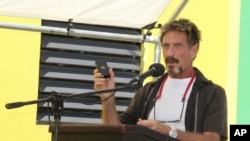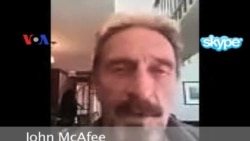To call John McAfee unconventional is to be correct in just about every way possible. Long before most were thinking about protecting their computers from malware and hackers, John McAfee was already writing some of the world’s first anti-virus programs.
As CEO of a multi-billion dollar software company, he cut a kind of swash-buckling figure, much in the same vein as Space X’s Elon Musk or Virgin Airlines’ Richard Branson. After selling his firm, the millionaire McAfee moved to Central America and adopted a lifestyle perhaps best described as unusual. (McAfee himself has even poked gentle fun at his “eccentric” reputation.)
Now, John McAfee is set to run what is sure to be the most unconventional bid in the 2016 U.S. presidential race. Heading the newly created Cyber Party – “Privacy, Freedom, Technology” – McAfee is launching what he promises will be the first-ever purely digital political campaign.
VOA recently spoke with John McAfee about his priorities, his campaign, and the importance of cyber as a political issue. This interview has been edited for length and clarity; you can watch the complete, unedited interview in the video below.
VOA: How straight a line is it from John McAfee, anti-virus pioneer, to John McAfee, presidential candidate?
It’s not a straight line at all, obviously. But it makes sense to me, and it makes sense to my advisors and friends. I think the thing that our government lacks – just about more than anything else – is technological competence. We have some of the greatest white-hat hackers in the world here in the U.S., but the government seems to be technologically illiterate.
If you look at the people running for president, they say nothing whatsoever about it…or what they have said is astonishing. Donald Trump admits to never having sent an email – it’s 2015! Hillary Clinton was asked if she wiped the disc she was using for her email; she said ‘Do you mean with a damp cloth?’ This, to me, is frightening.
The next war is going to be a cyber-war. I don’t think anyone doubts that, and we have a government that is technologically illiterate in cyber.
VOA: You mention cyber-war. There’s a lot of talk now of hardening physical targets to terrorism. How vulnerable do you think our digital infrastructure is – the stuff that controls chemical plants, electricity generation, and such?
Very vulnerable. I have a friend who is a white-hat hacker who had a contract with a major power company that provided power to several states. He noticed that gardeners would come in every Thursday, and only the lead truck had paperwork. So they went and bought a truck and tools and uniforms and got in line, and they got inside the security perimeter. Once inside, they took off their uniforms and had suits on underneath; they walked in and got all the way to the main data center when a guard caught them picking the lock. My friend jumps up and says ‘I’m glad you’re here; we’ve been having so many complaints about this door sticking.’ The guard opened it and walked off. Like that, they were in the main data room.
It’s terrifying that this can happen – and this is without technology. Others using technology had broken in before, and either could have brought the power down to several states for months. That’s a horrifying idea.
VOA: How do you explain what you call this overall governmental incompetence when it comes to cyber-issues?
Everyone knows that a federal job is a lifetime job, and for many in Congress, it seems they have a lifetime job, too. They’re not motivated to keep up with technology. I’ve been in technology my entire life and it’s hard for me to keep up. This is unlike corporations, where if you don’t do your job, you get fired and replaced. This simply can’t continue.
As to my platform, obviously cybersecurity is a leading part of it. But so is freedom and privacy. We’ve lost so much privacy from the invasive tactics of the NSA, the FBI, and other covert government agencies. They (the FBI) want to make it difficult to put encryption in our software and basically open up our lives. This is twisted thinking.
The NSA says: “We’re here to protect you, and we want you to open up your kimono so we can look inside and see every finite detail so we can assure you you’re not the enemy.” Does anyone feel protected? I don’t; I feel like the enemy.
The government generally is just too top-heavy. For example, I don’t think anyone thinks the TSA is effective. Every time it’s tested, federal marshals can get guns and knives and whatever they want through. If we sent every federal employee of the TSA home and continued to pay their salary, that would cost $1.5 billion dollars a year. However, the TSA’s total budget is nearly $7 billion a year. So close down the TSA, keep all the employees on the payroll, and we’ve still saved $6 billion dollars a year. Why not take that and spend it on cyber? We could hire a bunch of hackers and really fix the problems we have.
There’s another, larger issue: at its root, why do we have terrorism? Is it not because we and other countries have interfered in the internal affairs of other nations, third world nations many times, and that’s going to generate a lot of anger? When anger is combined with a sense of helplessness and frustration, terrorism is going to occur. We’re nearly $20 trillion in debt; how can we afford to be the world’s policeman?
VOA: How would a McAfee presidency differ from what we’ve seen over the last years of President Obama, or President George W. Bush? I think it’s time to invoke Article V of the Constitution and have a constitutional convention. Governments are created to serve people. I’ll ask you: do you feel served by your government? Isn’t government now a seat of power rather than a seat of service? If the people could get their representatives to form a constitutional convention, we could create a set of amendments that would fix the things that are wrong. It’s not going to be fixed by the people.
VOA: So if it’s time for a constitutional convention, what are the key elements that you would push for?
I think there are a lot of things I would personally do, but keep in mind, the purpose of a constitutional convention is for the people to decide. I have ideas: term limits for Congress is one. Number two: a mandate that we can’t create money when we don’t have any.
Most businesses – car manufacturers, refrigerator manufacturers, software manufacturers – have to make money in order to survive. If there’s no money in the bank, they can’t go out and buy what they want. That’s a fact of life. But our government prints it. That’s unreal – the world doesn’t work that way. So I would mandate, by law, that if something comes up, the government could sell something, fire a bunch of people, do what any rational entity would do.
But it’s really for the people to say. We already almost have a two-thirds majority of states that have called for a constitutional convention over the past two hundred years; we only need a few more. If that happens, then the people get to choose their representatives. You sit down with them and say ‘Here’s what we need. Go and do it.’ And then you go off and have a convention, and at the end you have amendments to the Constitution that are up-to-date to the problems of 2015. We’re operating like it’s the 1800’s. That has to change, and the only way I see that can change is through a constitutional convention.
The people need a voice, and the only voice they have anymore is through a constitutional convention. It needs to be invoked. Governments are here to serve. When they stop serving, it’s the right and the obligation of the people to change it, or even abolish it. Article V gives us that right; we need to take that power now.
VOA: You’re someone imbued in the cyber-world. How are you going to use that in this campaign, and how could cyber transform U.S. politics?
Gallup said two days ago they’re not going to do political polls. Why? Because they can’t. We’re in the age of the Internet. We should be able to take a poll instantly. We should be able to find out right now second what people are thinking. Push a button, wait an hour, we have the results. Good Lord, that’s the power we have.
We have facilities using modern-day software on mobile devices where I can have a video conference with the entire country, and you can ask questions. You can ask questions by typing; there’s software that will collate these and give me the top twenty, and I can answer the top twenty questions the country has. We’re working on that now and hope to have it out by mid-December.
Why isn’t Trump doing it? Why isn’t Hillary Clinton doing it? Why aren’t the national parties; why don’t they do this? Politicians need to stop blabbering and start listening to the American public. We are a collective country and a democracy. How on Earth are we going to manifest that democracy if we don’t listen to the populace?
VOA: Is there a country that you could point to that you think is getting it more right – in terms of cyber-integration, or even just more generally?
Absolutely. There are two I can think of. China’s one, the second is Russia. Now I’m not certainly saying they’re getting it right politically – but they are getting it right technologically. They have weaponized software, and have co-opted our older satellites for communications so we can’t possibly trace back any hack that’s done by China. They’re so far ahead of us it’s frightening, and this has to change.
VOA: Final question – moving forward, what can we expect from the McAfee campaign, and how are you going to finance it?
The finance part is trivial; we’re running a purely electronic campaign. We need a computer and access to the Internet, that’s it. I chose to base my campaign headquarters in Opalika, Alabama, because it’s one of six cities in America that have a 1-Gigabit upload and download to the Internet. With that I can do anything.
You’re not going to see me unless you’re on the Internet. I’m not going to be on Fox or MSNBC, and I’m certainly not going to go out and shake hands and kiss babies. I’ll be under the radar. But recognize something: 75% of Americans get their news from the Internet. Not from Fox, CNN, or NBC, but the Internet. That’s where I am and that’s where I have mastery. We’re going to start fireside chats over the Internet, where people can download an app and watch and listen and respond over the Internet. If you’re an Internet person; I’m there.
WATCH: Full interview with John McAfee











